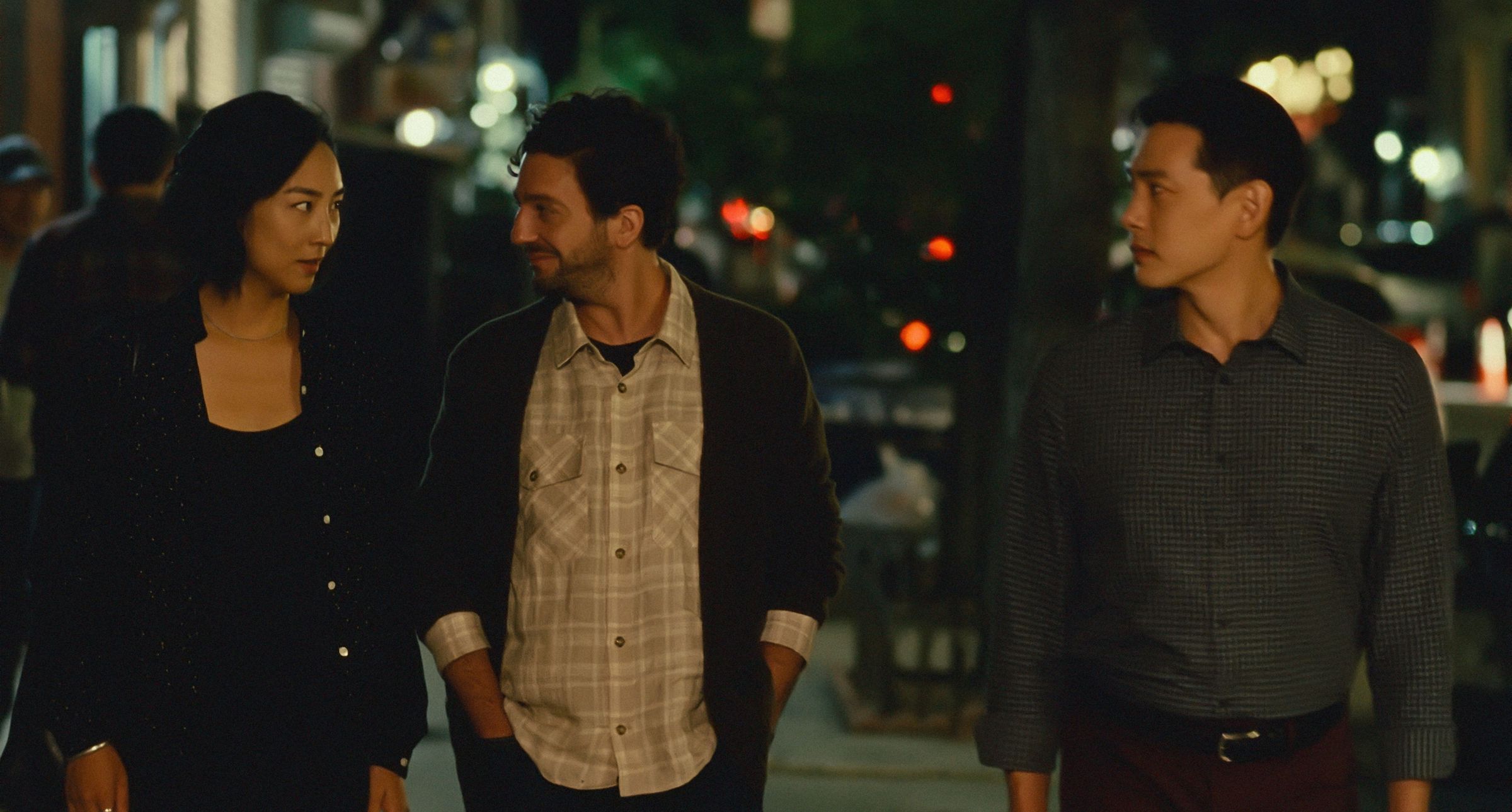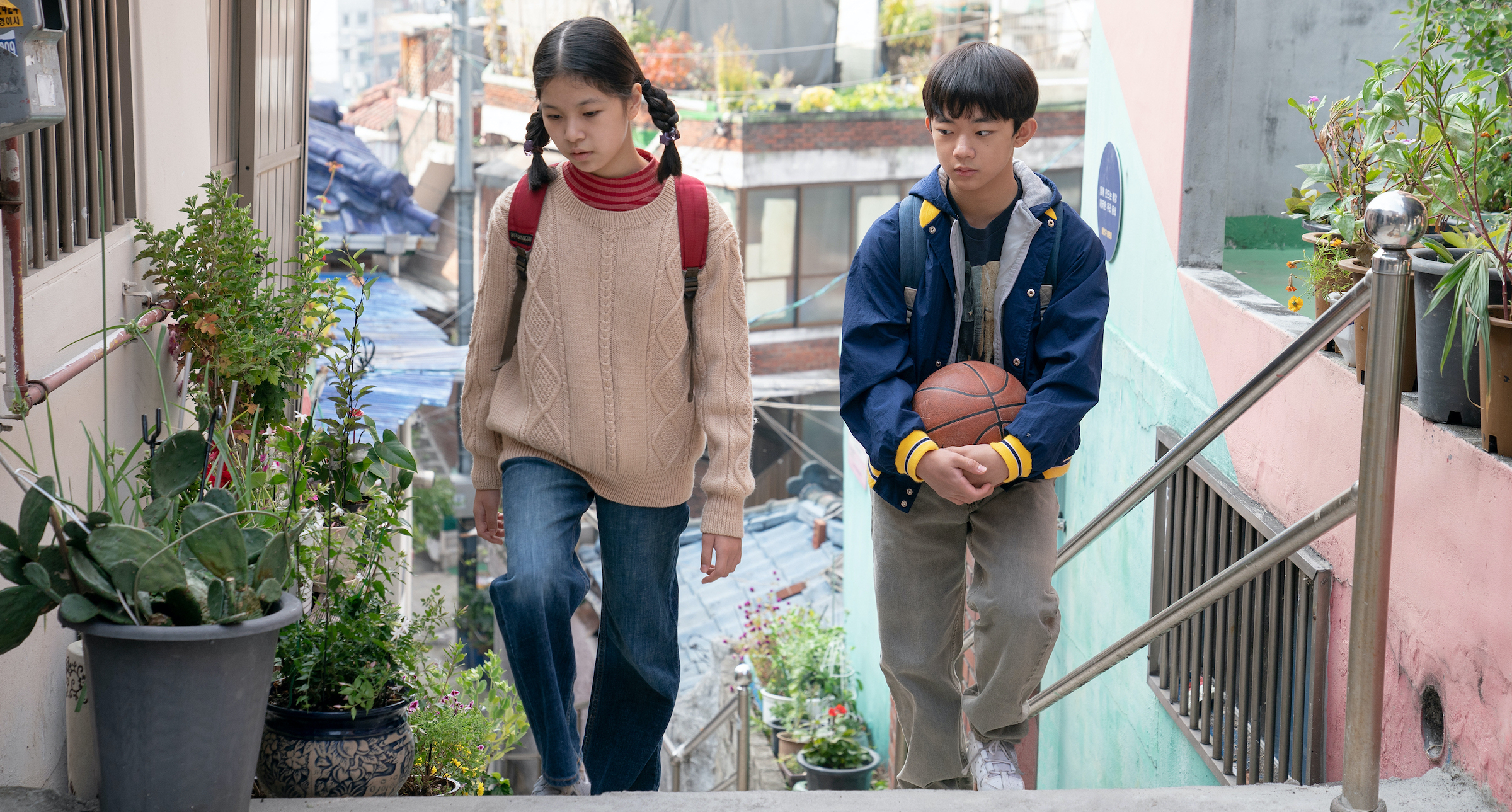
People pair off for so many reasons: convenience or habit, great sexual chemistry, the desire to have children, or simply what they see as true love. There are always those people who advertise loudly that they’ve found their soul mate, holding their good fortune high like a victory flag. But is it possible that there are different kinds of right for any one human being? Is it normal to wonder what might have been—to ponder what your life might be like if you’d chosen another partner—or is it a betrayal of the person who sleeps beside you every night?
Those are questions writer-director Celine Song’s extraordinary debut film Past Lives doesn’t so much answer as brush against, like the flutter of moth wings. Uncertainty is a kind of shadow character in this film, floating through it like a ghost. The movie’s opening shot shows us a woman sitting at a bar, flanked by two men. She seems more engaged in talking with one of them, while the other sits a bit awkwardly, aware he’s being left out but trying to be cool about it. An unseen observer, surveying this scene from across the bar, wonders aloud what their story is: Are the intensely connected man and woman siblings? Is the left-out dude the woman’s boyfriend? These are the types of things we ask ourselves when we play the game of piecing together strangers’ stories, making up lives for them like amateur dramatists.
But the real story of these characters is more complex than anything we could surmise from that first scene. Song begins to unravel that story by taking us back 24 years to begin at the beginning: A preteen girl named Na Young (Seung Ah Moon) is getting ready to emigrate to Canada from South Korea with her parents. There’s a boy she likes at school, Hae Sung (Seung Min Yim); the feeling is mutual. These two are smart kids, competing with one another in their classes, though their healthy competitiveness is part of the electricity between them. Na Young’s mother, knowing how much they like each other, sets up a chaperoned date for them, explaining to a friend that she wants her daughter to have good memories from the place she’ll soon leave behind.

Read more: The 10 Best Movies of 2022
Song then moves the story 12 years forward: Na Young now calls herself Nora—as a grownup, she’s played by Greta Lee—having left her old name behind long ago. She’s just moved to New York, hoping to launch a career as a playwright. Googling old friends from home to see what they’re up to, she’s reminded of the boy she used to be so close to, though she at first struggles to remember his name. They manage to connect on social media; she types a short message to him in her rusty, hunt-and-peck Korean. Eventually, they communicate by Skype. Nora and Hae Sung (now played by Teo Yoo) peer at one another through their respective computer screens, at times just blinking, not talking, as if trying to map the contours of the lost years. Their faces are lovely, luminous with curiosity and mutual discovery. In their adult guises, they’re new to each other, and yet not.
They spend more and more time on Skype, and a possible romance takes shape. But circumstances prevent them from reconnecting in real life. Eager to make the most of her life in New York, Nora tells Hae Sung she thinks it’s best if they don’t talk for a while. Soon after, at a writing retreat, she meets Arthur (John Magaro), a scruffy young novelist. They strike up an affair that at first seems off-handed, a thing they’re just doing for kicks. Twelve more years pass, by which time they’re married, living in the East Village and chipping away, with slow but steady success, at their parallel careers.

Then Hae Sung comes to New York for a visit.
Song has said the story she tells in Past Lives is semiautobiographical, and that’s easy to believe. The movie ripples with the quiet melodrama of real life, the way big things often happen in the margins, and small things gradually come to mean the world. Song—herself a playwright—has clearly put her trust in the faces of her actors, and they wholly fulfill it. Yoo’s Hae Sung has a searching gravitas. When he’s speaking Korean with Nora, he has a boyish, confident sweetness. But his English, limited to a few words and phrases, makes him an outsider in her world, and Yoo’s eyes alone transmit how keenly he feels that alienation; this is, among other things, a story of how languages can both divide and unite. Magaro, a consistently wonderful actor (as proven in Kelly Reichardt’s two most recent films, First Cow and Showing Up), works a kind of shambling magic with the character of Arthur. As Nora prattles on about her impressions of Hae Sung and their recently revived friendship, he tries, with zero success, to feign both supportiveness and indifference. In one of the movie’s most gently resonant scenes, he tells Nora what he loves about living with her. To him, she makes the world seem bigger. “I’m wondering if I do the same for you,” he says in a faraway voice that makes the other side of the bed seem like another continent.
Read more: The 30 Most Anticipated Movies of Summer 2023
There are no villains in this story; no one lashes out or behaves badly. At one point Arthur makes a joke about being the overbearing white guy who’s standing in the way of true love, but that’s hardly the truth. Nora is intensely practical, a bit unyielding. You can tell she’s a person who arranges things rather than just letting them happen. And the way Lee plays her helplessness in the face of feelings she can’t control is what gives Past Lives its delicate, bittersweet kick. As Nora, Lee—probably best known for her role in Russian Doll—has the demeanor of someone who just wants to get on with life, not realizing that a whole new set of possibilities can sometimes present itself between one breath and another. Once that recognition hits, Nora realizes how lost she is—but then, paradoxically, being lost may be the only true way to ever be found. The ending of Past Lives faces that double-edged truth with the most tender gaze imaginable. Somewhere between the right and the wrong decision is the choice we learn to live with, a sea of joy and sadness and everything in between.
More Must-Reads from TIME
- Cybersecurity Experts Are Sounding the Alarm on DOGE
- Meet the 2025 Women of the Year
- The Harsh Truth About Disability Inclusion
- Why Do More Young Adults Have Cancer?
- Colman Domingo Leads With Radical Love
- How to Get Better at Doing Things Alone
- Michelle Zauner Stares Down the Darkness
Contact us at letters@time.com